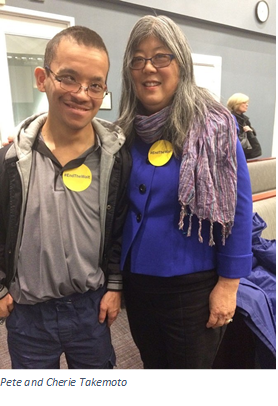Never Go to College? Why Not?

Most parents dream that one day their children will go to college. But such dreams may grow distant and seem unrealistic when a child is born with a developmental disability. It could have been that way for us. Our son, Pete was born with an undiagnosed genetic syndrome that affected his motor skills, feeding, heart, and almost every aspect of his development. He was labeled “failure to thrive” because he couldn’t keep enough food down to grow. He cried, fussed, and struggled through therapy and doctor visits. Because of his very complex care needs, we requested a multidisciplinary coordination meeting to manage his care. The chair opened the meeting by stating, “Well, we may not know what Peter has, but one thing we do know is that he will never go to college.”
Never go to college? If he didn’t know what Pete had or how to treat his complex needs, how dare he draw that conclusion! Those fighting words stayed with me for many years as I worked to create a path to success for Pete. And thanks to others who have broken down barriers to college for people with disabilities, Pete graduated from college last month through a program at George Mason University. As we were sending out graduation announcements, he suggested we send one to that naysayer to show how wrong he was about Pete’s potential!
Up until recently, college was unimaginable for children with developmental disabilities. It would have been unimaginable to me too, without inspiration from the groundbreaking advocates I met along the way on my own journey. When Pete was still in elementary school, I had the great privilege to meet Rud and Ann Turnbull, from the Beach Center at the University of Kansas (www.beachcenter.org/) whose son, Jay, spent many years having what they call “an enviable life” on the KU campus. Barbara Buswell, from the PEAK Parent Center (http://www.peakparent.org/) also created new paths for educational and community experiences for her son. These centers continue to disseminate some of the most radical, yet research-based ideas about the limitless possibilities for people with even the most significant disabilities.
As Pete neared the end of high school, I found out that my friend, Stephanie Smith Lee was looking for college options for her daughter, who also has developmental disabilities. So I connected Stephanie with colleagues at George Mason University. Together, they developed a vision and a business plan for a four-year college program focused on academics, job preparation, college life, and independent living. The Mason LIFE Program (http://masonlife.gmu.edu/) is an innovative post-secondary program for young adults with intellectual and developmental disabilities. The mission of the Mason LIFE Program is to provide a supportive academic environment for our students with intellectual and developmental disabilities; and to supply an apprenticeship for George Mason University students. The program has become a model program and Stephanie Smith Lee, a former director of the Office of Special Education Programs at the U.S. Department of Education, continues to consult with colleges and universities who are interested in setting up programs in the U.S. and internationally. She can be reached at StephanieSmithLee@gmail.com.
Today, there are also resources for teens with disabilities who are considering college. The Going to College (http://www.going-to-college.org/) site helps teens to articulate strengths, needs, and priorities, communicate about their disability, and develop an advocacy plan. The site also gives valuable information and tips for preparing for college.
Think College! (www.thinkcollege.net) is a project of the Institute for Community Inclusion dedicated to developing, expanding, and improving inclusive higher education options for people with intellectual disabilities. Its initiatives are funded by grants from the National Institute on Disability and Rehabilitation Research, the Administration on Intellectual and Developmental Disabilities (AIDD), the Office of Special Education Programs, and the Office of Postsecondary Education. One new initiative is a 25 minute documentary illustrating the benefits of such options for college students with developmental and intellectual disabilities. Rethinking College, was funded in part by a grant from AIDD of the U.S. Department of Health and Human Services and can be viewed from the website.
Pete continued his postsecondary education by attending classes taught by Mason graduate students; auditing college courses; working in a variety of settings including the police department, a social services agency and Capitol Hill; living on campus, and embracing the life of a college student.
So what is next for Pete? Now that he has had a taste of independence, he is working on plans to move into a house with other roommates. He is looking to expand his part-time job into a full- time job. In the meantime, he fills free time with volunteer work and hanging out with his friends. While his disability means that some things are more difficult for him, disability does not define who he is or what he can do. Why focus on his limitations when he has so many possibilities?
Cherie Takemoto is a Project Manager at New Editions, leading vocational rehabilitation and disability research projects. She brings over 20 years of experience managing disability advocacy and information resource programs related to transition, instructional technology, and cultural competency. She expects to complete her Ph.D. in Educational Leadership next year. Read Cherie's bio.
